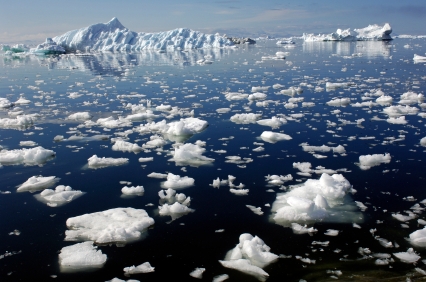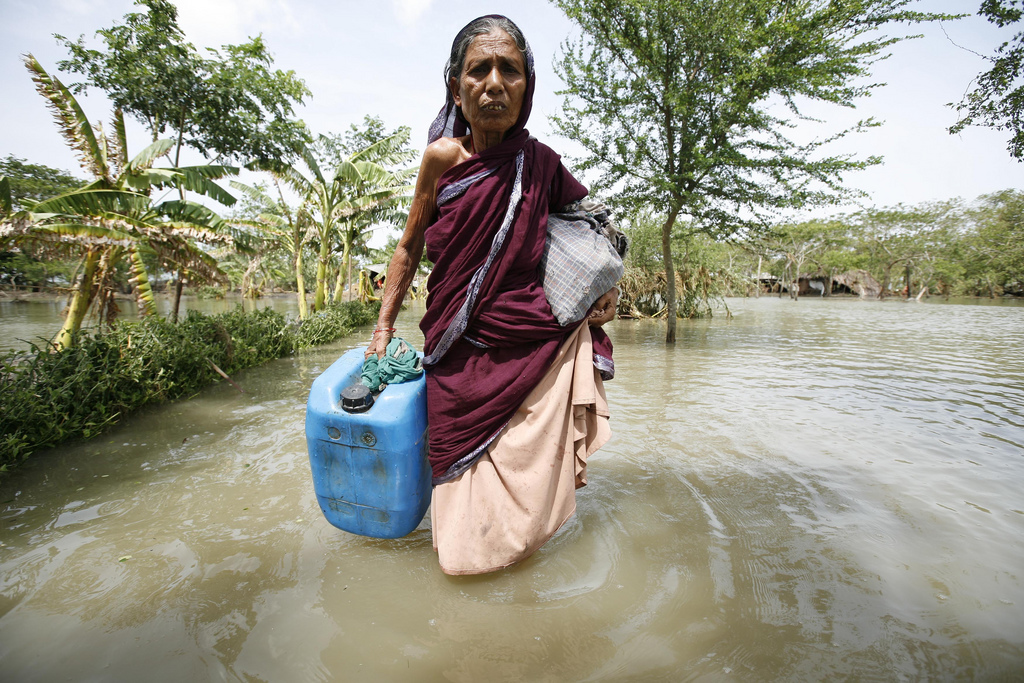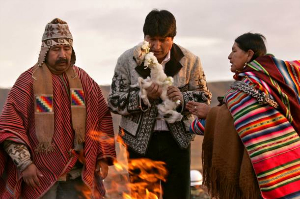IPCC
-
Melting ice could lead to massive waves of climate refugees
As the earth warms, the melting of the earth’s two massive ice sheets—Antarctica and Greenland—could raise sea level enormously. If the Greenland ice sheet were to melt, it would raise sea level 7 meters (23 feet). Melting of the West Antarctic Ice Sheet would raise sea level 5 meters (16 feet). But even just partial […]
-
Climate change is sexist
This is the second dispatch by Population Action International from global climate change talks in Bonn, Germany. Read the first. A Bangladeshi woman searches for drinking water after a cyclone.Photo: Abir Abdullah/OxfamOne of the under-reported issues about climate change is its dramatic affect on women. A side event I attended this afternoon, organized by the […]
-
Bolivia’s leader pushes rich nations for climate adaptation funds
President Evo Morales of Bolivia never shies away from a scuffle. He was elected as Bolivia’s first indigenous president after toppling the previous government with massive street protests, and he has since legalized the coca leaf, nationalized the mines, and tossed out the U.S. ambassador. Bolivian President Evo Morales makes an offering to the “Pachamama” […]
-
Why even strong climate action has such a low total cost — one tenth of a penny on the dollar
Since the nation is about to launch into a long debate about the costs of climate action versus the cost of inaction, here is an overview of the major cost analyses of global climate action. In its definitive 2007 synthesis report of the scientific literature, the Intergovernmental Panel on Climate Change [PDF] concluded: In 2050, […]
-
Todd Stern’s speech cheers delegates at Bonn climate talks
This dispatch was filed from the ongoing U.N.-sponsored climate change talks in Bonn, Germany. As expected, Sunday’s speech by Todd Stern at the U.N. climate talks in Bonn created quite a stir. Sitting in the rear of the hall, it was hard not to think back to the last time U.S. statements in a plenary […]
-
A mandarin’s plea for climate action
New Year’s Day is not, I suppose, everyone’s idea of the best time to receive a sobering message. But like it or not, this year it happened to me. The message that popped into my inbox, unannounced and unexpected, would have brought even the most hungover dreamer smartly back to reality. “Today,” it opened uncompromisingly, […]
-
U.S. media largely ignores latest warning from climate scientists
In the last two years, our scientific understanding of business-as-usual projections for global warming has changed dramatically (see here and here). Yet, much of the U.S. public — especially conservatives — remain in the dark about just how dire the situation is (see here). Why? Because the U.S. media is largely ignoring the story. Case […]
-
Sea levels to surge at least a metre by 2100, scientists warn at Copenhagen meeting
COPENHAGEN — Months before make-or-break climate negotiations, a conclave of scientists warned Tuesday that the impact of global warming was accelerating beyond a forecast made by U.N. experts two years ago. Sea levels this century may rise several times higher than predictions made in 2007 that form the scientific foundation for policymakers today, the meeting […]
-
The ideological tensions inside the IPCC gives its reports alarming credibility
Over on DotEarth, Andy Revkin has an interesting post about the "burning embers" diagram from the latest IPCC. The upshot of the story is that several countries well-known for their desire to do nothing about climate change were able to remove an alarming figure from the 2007 report:
The diagram, known as "burning embers," is an updated version of one that was a central feature of the panel's preceding climate report in 2001. The main opposition to including the diagram in 2007, they say, came from officials representing the United States, China, Russia and Saudi Arabia.
People who argue that the IPCC is an "alarmist" body forget that virtually all of the world's governments belong to it. Thus, governments that don't want to do anything about climate change have just as much input to the report as countries that do.This tension between the ideological factions of the IPCC actually gives the reports credibility. Only statements that everyone agrees to make it into the report. A few countries that object to some result can keep it out of the report. This is, in fact, why the IPCC process was designed this way.
This is why some people argue that the actual science of climate change is more alarming than that revealed in the IPCC reports. In any event, if you read the IPCC reports and find it alarming, then you can have great confidence that your alarm is warranted.


